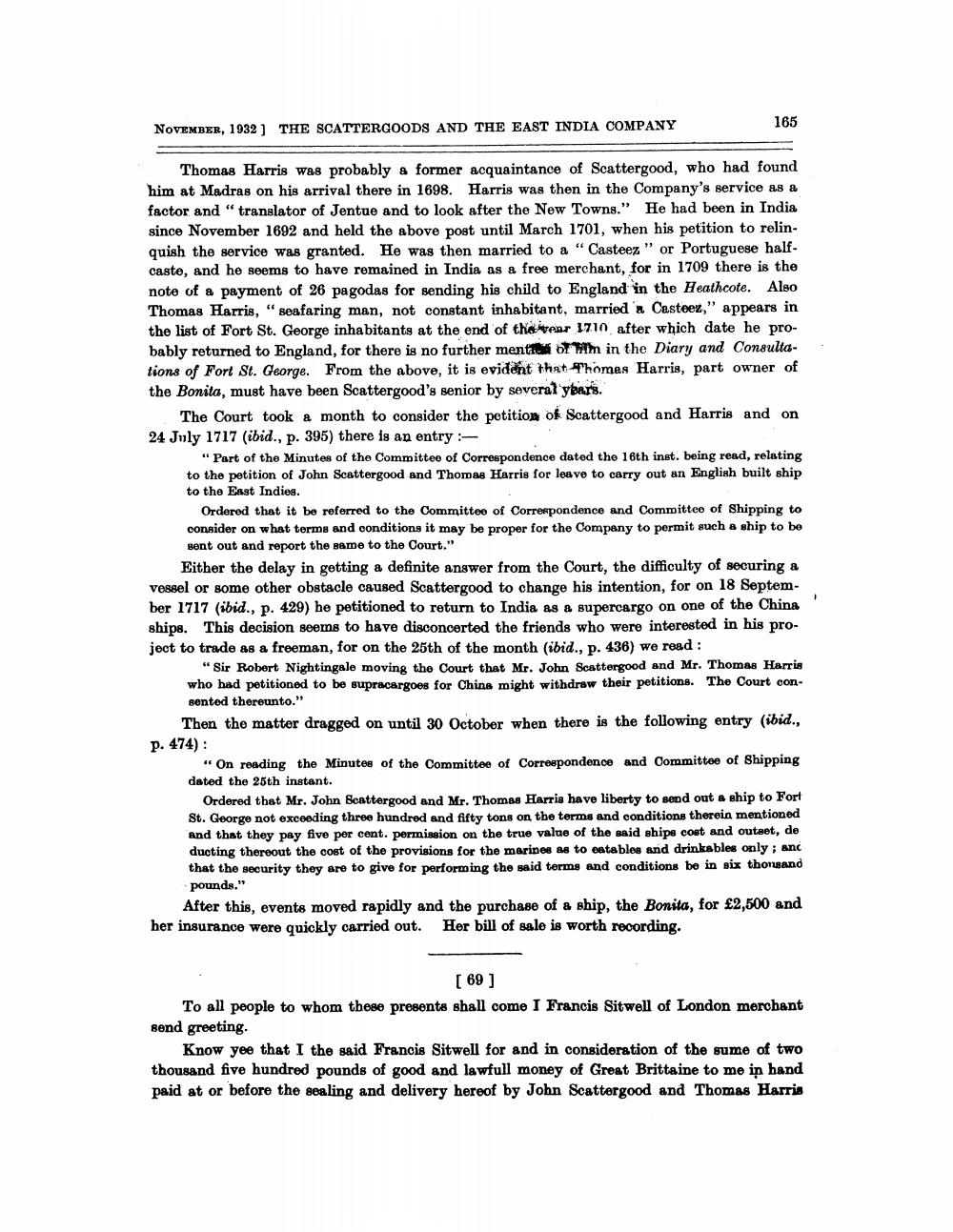________________
NOVEMBER, 1932) THE SCATTERGOODS AND THE EAST INDIA COMPANY
165
Thomas Harris was probably a former acquaintance of Scattergood, who had found him at Madras on his arrival there in 1698. Harris was then in the Company's service as a factor and “translator of Jentue and to look after the New Towns." He had been in India since November 1692 and held the above post until March 1701, when his petition to relinquish the service was granted. He was then married to a “Casteez" or Portuguese halfcaste, and he seems to have remained in India as a free merchant, for in 1709 there is the note of a payment of 26 pagodas for sending his child to England in the Heathcote. Also Thomas Harris, "seafaring man, not constant inhabitant, married Casteez," appears in the list of Fort St. George inhabitants at the end of the tear 1710 after which date he probably returned to England, for there is no further menties of Wim in the Diary and Consultations of Fort St. George. From the above, it is evident that Thomas Harris, part owner of the Bonita, must have been Scattergood's senior by several ybars.
The Court took a month to consider the petition of Seattergood and Harris and on 24 July 1717 (ibid., p. 395) there is an entry :
"Part of the Minutes of the Committee of Correspondence dated the 16th inst. being read, relating to the petition of John Scattergood and Thomas Harris for leave to carry out an English built ship to the East Indies.
Ordered that it be referred to the Committee of Correspondence and Committee of Shipping to consider on what terms and conditions it may be proper for the Company to permit such a ship to be sent out and report the same to the Court."
Either the delay in getting a definite answer from the Court, the difficulty of securing a vessel or some other obstacle caused Scattergood to change his intention, for on 18 September 1717 (ibid., p. 429) he petitioned to return to India as a supercargo on one of the China ships. This decision seems to have disconcerted the friends who were interested in his project to trade as a freeman, for on the 25th of the month (ibid., p. 436) we read :
"Sir Robert Nightingale moving the Court that Mr. John Scattergood and Mr. Thomas Harris who had petitioned to be supracargoes for Chins might withdraw their petitions. The Court consented thereunto."
Then the matter dragged on until 30 October when there is the following entry (ibid., p. 474):
"On reading the Minutes of the Committee of Correspondence and Committee of Shipping dated the 25th instant.
Ordered that Mr. John Bonttergood and Mr. Thomas Harris have liberty to send out a ship to Fort St. George not exceeding three hundred and fifty tons on the terms and conditions therein mentioned and that they pay five per cent. permission on the true value of the said shipe cout and outset, de ducting thereout the cost of the provisions for the marines as to estables and drinkables only, and that the security they are to give for performing the said terms and conditions be in six thonsand pounds."
After this, events moved rapidly and the purchase of a ship, the Bonita, for £2,500 and her insurance were quickly carried out. Her bill of sale is worth recording.
[69] To all people to whom these presents shall come I Francis Sitwell of London merchant Bend greeting.
Know yee that I the said Francis Sitwell for and in consideration of the sume of two thousand five hundred pounds of good and lawfull money of Great Brittaine to me in hand paid at or before the sealing and delivery hereof by John Scattergood and Thomas Harris




